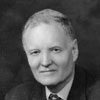Jerome and Dorothy Lemelson
Professor of Management & Economics
Dean Emeritus Coordinator,
Asia-Pacific Initiatives
Sloan School of Management

SMA and the MIT Industrial Liaison Program recently welcomed MIT Professor Lester Thurow. The seminar was co-hosted by NTU and delivered simultaneously to MIT, NTU and NUS via videoconferencing on February 20, 2002. Dean Magnanti introduced Professor Thurow, and addressed Deputy Prime Minister Tony Tan, President Cham Tao Soon of NTU, dignitaries from Southeast Asia, NTU and NUS leadership, the Singapore-MIT Alliance Governing Board Members, and the audiences from MIT, NTU, and NUS.
Professor Thurow began by drawing a mental picture of the three pivotal revolutions in history. First, the industrial revolution, which ended 8000 years of agricultural subsistence. Second, the German idea of systematic investment in research and development based on academic science, combined with the harnessing of electricity. Third, the rapid progress of six key technologies: Microelectronics, computers, telecommunications, manmade designer materials, robotics, and biotechnology. During each revolution, some countries progressed, while others fell behind. "It's not always a division between the first and third world," Thurow said. "After all, mainland China is the biggest beneficiary of the latest revolution with 1.3 billion people, low income, 40% of their country considered third world, and economic growth at 8% per year due to globalization."
Thurow believes that everyone from the "old economy" who survives will do so only by using the new technologies. It's merely a question of when they'll begin to implement them. As an example, he spoke of troops in Afghanistan, and the fundamental difference in the nature of warfare based on new technologies. "We know precisely where every soldier is because they all have a chip in their shoe used in conjunction with a GPS," he said. "Generals watch their movements on a big screen."
Thurow acknowledged that governments will also need a new business model. "Governments in the 20th century got used to thinking of themselves as air traffic controllers," Thurow explained. "In a global economy, they need to think of themselves as airport builders, with infrastructure and development, social capabilities, and the ability to clean up economic messes like recessions or financial crashes, which are genetic components of capitalism."
Thurow feels that the cause for the current recession is almost entirely due to over-investment in telecommunications, as it is broadly defined: Fiber optics, servers, routers, and the Internet. The global economy is suffering from ripple effects around the world. If the U.S. is in a two stage recession, Thurow believes Americans have only experienced the first stage — a significant fall in investments. The second stage would be a significant fall in consumption. In 1992, the average American family saved 9% of their income. In 1996, that figure dropped to 5%, and in the most recent Quarter, Americans saved nothing, expecting their portfolio to do it for them. Having just lost five thousand billion dollars in stock market wealth, 85% of Americans have more tied up in their house than in their portfolio. "If you can stop housing from falling, you can stop Stage Two of the recession," Thurow said.
The Japanese economy also poses problems. "How do you make the world economy work when the second largest economy hasn't worked for a decade?" challenged Thurow. Forty percent of families in Japan have a mortgage significantly above the value of their house and lack the legal structure, and cultural acceptance, to pursue bankruptcy. An additional challenge is China, with it's inconsistent growth numbers. Data is difficult to get and is often inaccurate, but political repercussions keep the system from operating efficiently.
What form will the global recovery take? According to Thurow, business investment is not going to go up. It won't be in net exports, because that would depend on the rest of the world having a boom — and we know they're not. It's not going to be in consumption. Thurow believes that the U.S. recovery depends on the Federal fiscal policy package, which has yet to be designed.
Thurow believes that in a knowledge-based economy, the way you manage knowledge becomes central to the difference between failure and success — thus the need for a Chief Knowledge Officer (CKO). To succeed in today's economy, businesses also need to make, buy, or sell technology. Citing an example, Thurow said Cisco's winning strategy was to buy research. Citing a lost opportunity, Thurow pointed to Steve Jobs deciding not to sell the Apple operating system. Calling today's uncharted territory an intellectual world, rather than a geographic one, Thurow encouraged participants to use the technology available, fight the fearof sea monsters, and enjoy voyages of exploration.